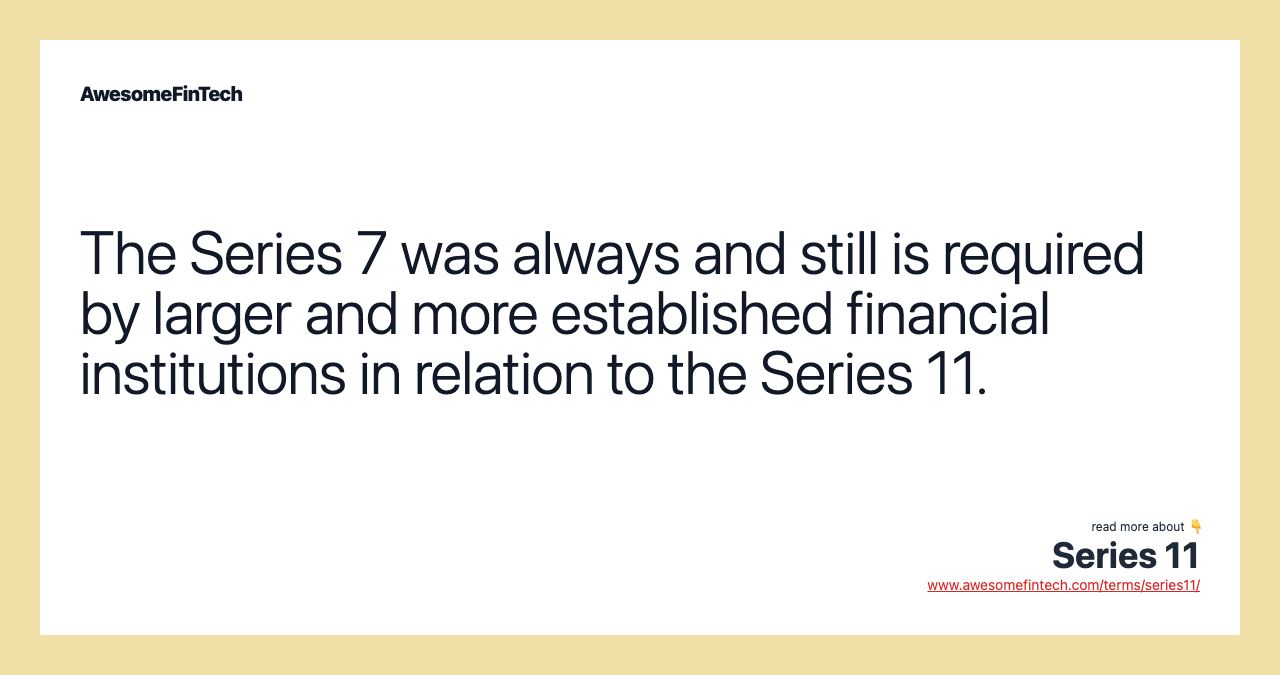Series 11
The Series 11 was a securities license that allowed holders to provide securities quotations and accept unsolicited customer orders for execution. The Series 7 was always and still is required by larger and more established financial institutions in relation to the Series 11. The Series 11 covered persons associated with a FINRA member firm who accepted telephone or other communications from the public for the purposes of providing current securities quotations and accepting unsolicited customer securities orders (with the notable exception of the aforementioned municipal securities and direct participation programs) for submission to the normal order execution operations of the member. Assistant representative-order processing registrants were prohibited from conducting the following activities: Dually registering as a representative or principal Rendering investment advice or opinion Making recommendations Making transactions in securities markets on behalf of the firm Accepting or opening new accounts Prequalifying potential customers Effecting transactions in municipal securities Effecting transactions in direct participation programs The Series 11 was a securities license issued by the Financial Industry Regulatory Authority (FINRA) that allowed brokers to provide securities quotations and accept unsolicited customer orders for execution. In 2018, FINRA retired the Series 11 examination and the corresponding license, and sales representatives are now required to complete the Series 7 exam and the SIE exam.

What Was the Series 11?
The Series 11 was a securities license that allowed holders to provide securities quotations and accept unsolicited customer orders for execution. Also known as the Assistant Representative - Order Processing Examination (AR), the Series 11 was administered by the Financial Industry Regulatory Authority (FINRA). In 2018, FINRA retired the Series 11 license.
The license applied to brokerage sales assistants that took and entered unsolicited client orders from broker-dealer customers for execution. It did not permit them to accept orders for municipal securities or direct participation programs, however. There was no prerequisite for taking the exam, though a candidate had to first be registered with FINRA.







Understanding the Series 11
The Series 11 covered persons associated with a FINRA member firm who accepted telephone or other communications from the public for the purposes of providing current securities quotations and accepting unsolicited customer securities orders (with the notable exception of the aforementioned municipal securities and direct participation programs) for submission to the normal order execution operations of the member. An unsolicited order is one in which the broker did not make a recommendation to the customer but that the customer requested themself.
According to FINRA, an Assistant Representative - Order Processing registrant "may conduct the above-mentioned tasks only on the premises of the member, must be under the direct supervision of an appropriately registered principal, and may not receive extra direct or indirect compensation for the number or size of transactions effected."
The Series 11 license was in effect a shortened version of the Series 7, which was and is still required by large financial institutions for their sales representatives to obtain. This is often completed along with the Series 66. As a result, the Series 11 was retired and now sales representatives are required to complete the Series 7 and SIE exam.
Series 11 Prohibited Activities
Assistant representative-order processing registrants were prohibited from conducting the following activities:
Series 11 Structure and Content
The Series 11 Exam consisted of 50 scored multiple-choice questions. Candidates were allocated 60 minutes to complete the exam, which cost $80. A passing score was 70%. There was no penalty for guessing so exam takers were encouraged to endeavor to answer every question. The test was organized into the following sections:
After the exam was completed, candidates would receive a section-by-section informational breakdown of their performance, as well as their overall score. Candidates were not allowed to use any reference material during the exam, as it was a closed-book test. The exam's questions changed based on new regulations or amendments to existing regulations, so candidates were encouraged to keep abreast of potential developments.
Related terms:
Broker-Dealer
The term broker-dealer is used in U.S. securities regulation parlance to describe stock brokerages because the majority of the companies act as both agents and principals. read more
Broker and Example
A broker is an individual or firm that charges a fee or commission for executing buy and sell orders submitted by an investor. read more
Direct Participation Program (DPP)
A direct participation program (DPP) is a pooled entity that offers investors access to a business venture's cash flow and tax benefits. read more
Financial Industry Regulatory Authority (FINRA)
The Financial Industry Regulatory Authority (FINRA) is a nongovernmental organization that writes and enforces rules for brokers and broker-dealers. read more
Municipal Bond
A municipal bond is a debt security issued by a state, municipality or county to finance its capital expenditures. read more
Registered Representative (RR)
A registered representative (RR) is a financial professional who works with clients who are trading investments such as stocks and bonds. read more
Security : How Securities Trading Works
A security is a fungible, negotiable financial instrument that represents some type of financial value, usually in the form of a stock, bond, or option. read more
Series 23
Series 23 is an exam offered by the Financial Industry Regulatory Authority (FINRA). read more